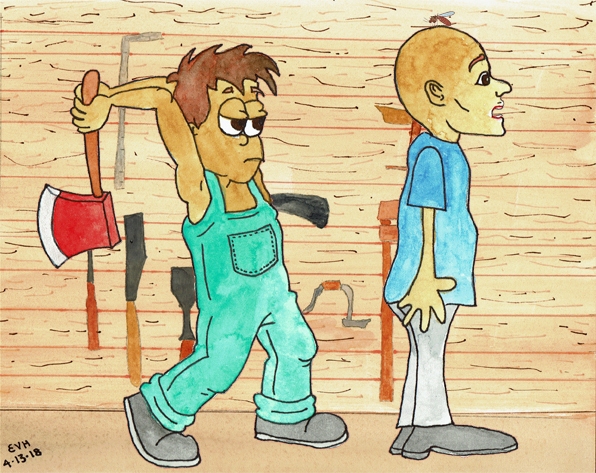
Jataka 44
Makasa Jātaka
The Mosquito
as told by Eric Van Horn
originally translated by Robert Chalmers, B.A., of Oriel College, Oxford University
originally edited by Professor Edward Byles Cowell, Cambridge University
This story sounds more like an episode of The Three Stooges than a morality tale. This would be a fun story to tell to a child.
There is a lot of humor in the Pāli Canon, although some of it is quite subtle. Ṭhānissaro Bhikkhu has written a book about it. It is called “The Buddha Smiles: Humor in the Pāli Canon.”
“Friends who lack sense.” This story was told by the Master while on an alms pilgrimage in Magadha. It is about some stupid villagers in a certain town. Tradition says that, after travelling from Sāvatthi to the kingdom of Magadha, he was on his alms round in that kingdom when he arrived at the town. This town was filled with fools. These fools met together one day and said, “Friends, when we are at work in the jungle, the mosquitoes devour us and that hinders our work. Let us arm ourselves with bows and weapons, go to war with the mosquitoes, and shoot or hack them all to death.” So off they went to the jungle, shouting, “Shoot down the mosquitoes!” Unfortunately, they shot and struck each other until they were in a sad state. They returned only to sink on the ground in the village or at its entrance.
Surrounded by the Saṇgha, the Master went to that village for alms. The sensible minority among the inhabitants no sooner saw the Blessed One then they erected a pavilion at the entrance to their village. After giving large alms to the monks with the Buddha at its head, they bowed to the Master and seated themselves. Seeing wounded men lying around on this side and that, the Master asked those lay people, “There are many disabled men about. What happened to them?”
“Sir,” they replied, “they went to war with the mosquitoes, but only shot one another and hurt themselves.”
The Master said, “This is not the first time that these foolish people have injured themselves instead of the mosquitoes they meant to kill. In former times, also, there were those who, meaning to hit a mosquito, hit a fellow creature instead.” And so saying, at the villagers’ request he told this story of the past.
Once upon a time when Brahmadatta was reigning in Benares, the Bodhisatta earned his livelihood as a trader. In those days in a border village in Kāsi there were many carpenters. And it so happened that one of them, a bald grey-haired man, was planing away at some wood with his head glistening like a copper bowl, when a mosquito landed on his scalp and stung him with its dart-like sting.
The carpenter said to his son, who was seated nearby, “My boy, there’s a mosquito stinging me on the head. Do drive it away.”
“Hold still then, father,” said the son, “one blow will settle it.”
(At that very time the Bodhisatta had reached that village in the way of trade and was sitting in the carpenter’s shop.)
“Rid me of it,” cried the father.
“All right, father,” the son answered. From behind the old man’s back, he raised a sharp axe on high intending to kill the mosquito. But he split his father’s head in two, and the old man fell dead on the spot.

Figure: “Hold still. I’ve got this.”
The Bodhisatta, who had been an eye-witness to the whole scene, thought, “It is better to have an enemy with sense then a friend like that. At least an enemy will be deterred from killing because of the fear of vengeance.” And he recited these lines:
Friends who lack sense are worse than enemies with sense.
Witness the son that sought to kill the gnat,
But split, poor fool, his father’s skull in two.
So saying, the Bodhisatta rose up and departed, passing away in after days to fare according to his karma. And as for the carpenter, his body was cremated by his kinsfolk.
“Thus, lay people,” the Master said, “in bygone times there also were those who, seeking to hit a mosquito, struck down another person.” This lesson ended, he showed the connection and identified the birth by saying, “In those days I was myself the wise and good trader who departed after repeating the stanza.”
